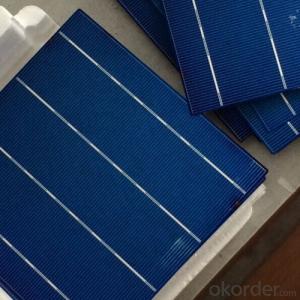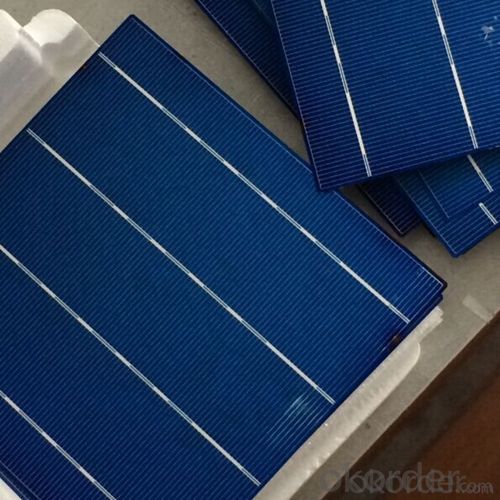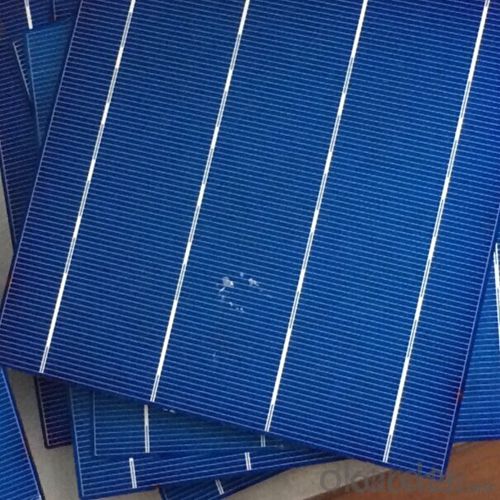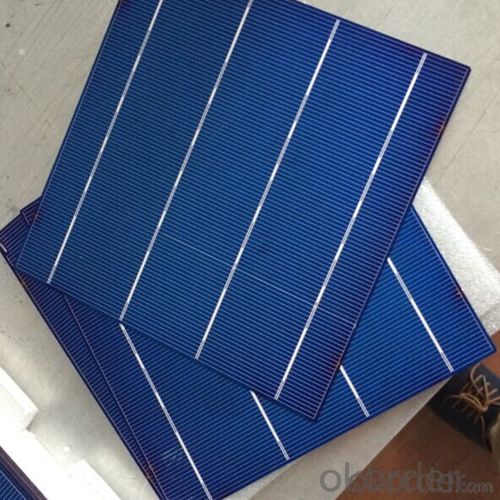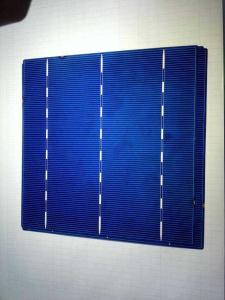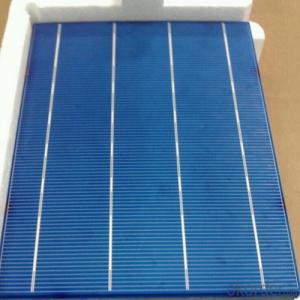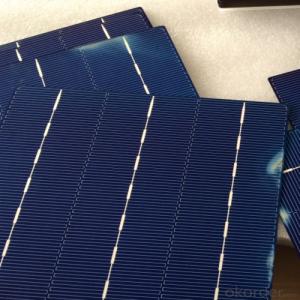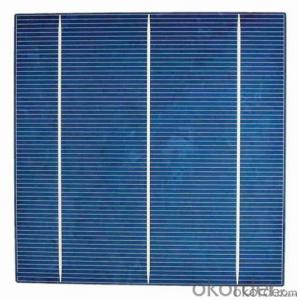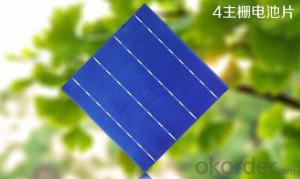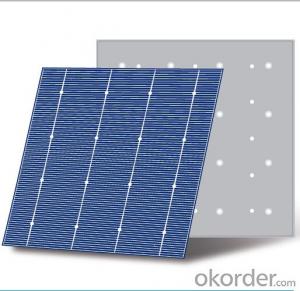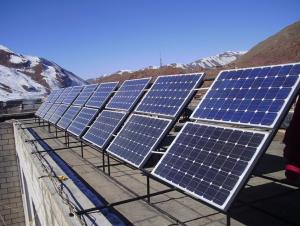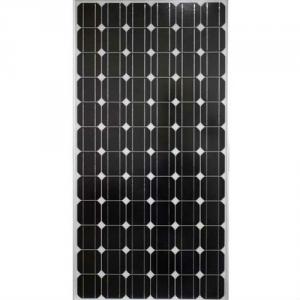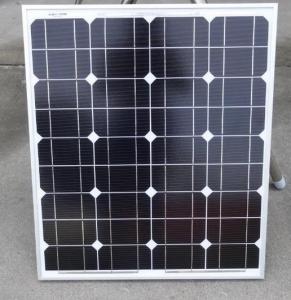III-V Solar Cells Poly Solar Cell 4BB Bus Bar B Grade with Low Price
- Loading Port:
- Shanghai
- Payment Terms:
- TT or LC
- Min Order Qty:
- 30000 pc
- Supply Capability:
- 3000000 pc/month
OKorder Service Pledge
OKorder Financial Service
You Might Also Like
Product description
Poly Solar Cell 4BB Bus Bar B Grade With Low Price
A solar cell, or photovoltaic cell, is an electrical device that converts the energy of light directly into electricity by the photovoltaic effect, which is a physical and chemical phenomenon.[1] It is a form of photoelectric cell, defined as a device whose electrical characteristics, such as current, voltage, or resistance, vary when exposed to light. Solar cells are the building blocks of photovoltaic modules, otherwise known as solar panels.
Solar cells are described as being photovoltaic irrespective of whether the source is sunlight or an artificial light. They are used as a photodetector (for example infrared detectors), detecting light or other electromagnetic radiation near the visible range, or measuring light intensity.
In contrast, a solar thermal collector supplies heat by absorbing sunlight, for the purpose of either direct heating or indirect electrical power generation from heat. A "photoelectrolytic cell" (photoelectrochemical cell), on the other hand, refers either to a type of photovoltaic cell (like that developed by Edmond Becquerel and modern dye-sensitized solar cells), or to a device that splits water directly into hydrogen and oxygen using only solar illumination.
Advantage Of Poly Solar Cell 156mm
1: High quality cell, Level B cell (14%—17.5%)
2.Dimensione:156*156mm Diagonal:200mm
3: Qualified certification: TUV,CE certification.
4: Warranty: five years for whole unit
Usage/Application Of Poly Solar Cell 4BB
1.The absorption of light, generating either electron-hole pairs or excitons.
2.The separation of charge carriers of opposite types.
3.The separate extraction of those carriers to an external circuit.
Product Images
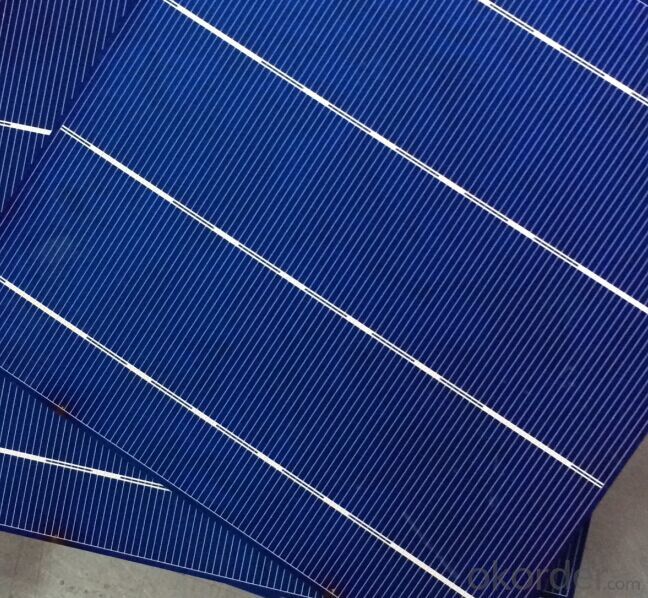
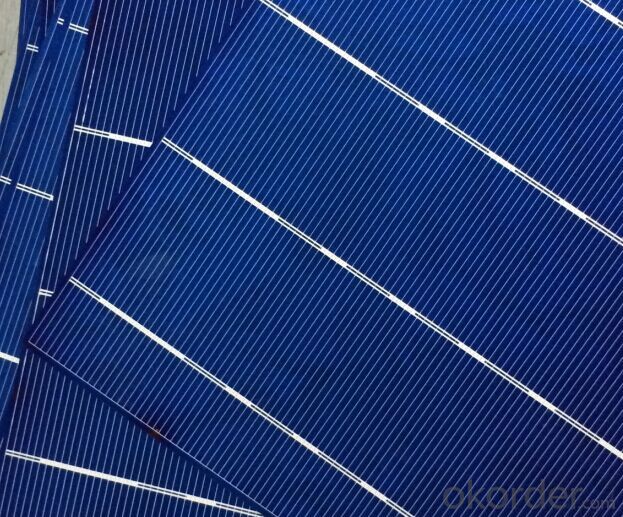
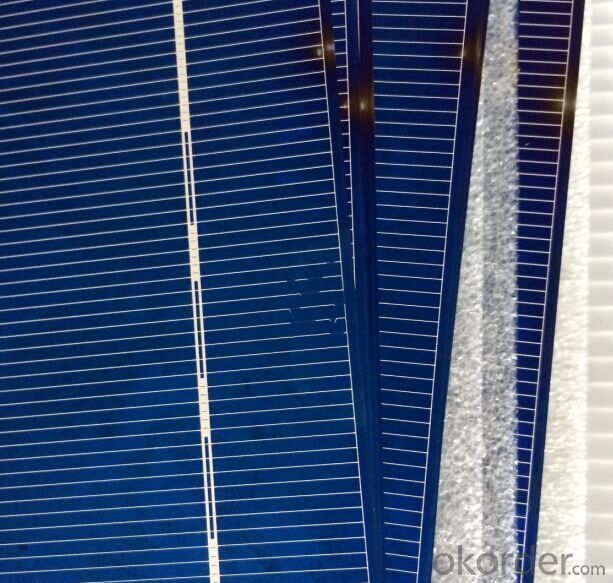
Temperature Coefficient of Cells
Voc. Temp . coef.%/K | -0.351%/K |
Isc . Temp . coef.%/K | +0.035%/K |
Pm. Temp. coef.%/K | -0.47%/K |
Electrical Characteristic
Efficiency (%) | Pmpp (W) | Umpp (V) | Impp (A) | Uoc (V) | Isc (A) | FF (%) |
17.25 | 4.197 | 0.524 | 7.992 | 0.62 | 8.458 | 80.03% |
17 | 4.137 | 0.524 | 7.876 | 0.619 | 8.353 | 80.01% |
16.75 | 4.076 | 0.522 | 7.81 | 0.617 | 8.286 | 79.73% |
16.5 | 4.015 | 0.518 | 7.746 | 0.613 | 8.215 | 79.73 |
16.25 | 3.955 | 0.515 | 7.683 | 0.61 | 8.144 | 79.61% |
16 | 3.894 | 0.512 | 7.613 | 0.608 | 8.075 | 79.31% |
15.75 | 3.833 | 0.51 | 7.534 | 0.605 | 8.058 | 78.62% |
15.5 | 3.772 | 0.508 | 7.453 | 0.604 | 8.02 | 77.87% |
15.25 | 3.771 | 0.505 | 7.35 | 0.604 | 9.997 | 76.83% |
15 | 3.65 | 0.503 | 7.271 | 0.604 | 7.989 | 75.64% |
14.5 | 3.529 | 0.499 | 7.067 | 0.604 | 7.988 | 73.14% |
14 | 3.407 | 0.499 | 6.833 | 0.604 | 7.833 | 72.01% |
Intensity Dependence
Intensity [W/m2] | Isc× [mA] | Voc× [mV] |
1000 | 1.00 | 1.000 |
900 | 0.90 | 0.989 |
500 | 0.50 | 0.963 |
300 | 0.30 | 0.939 |
200 | 0.20 | 0.920 |
FAQ
Q:What price for each watt?
A:It depends on the quantity, delivery date and payment terms
Q:What is your warranty system?
A:Our Solar cells performance guarantees for 25 years
Q:How do you pack your products?
A:We have rich experience on how to pack thecells to make sure the safety on shipment when it arrives at the destination.
- Q: Can solar cells be used in commercial applications?
- Yes, solar cells can be used in commercial applications. They are commonly used in various commercial sectors such as power generation, agriculture, transportation, and telecommunications. Solar panels are installed on rooftops or in open spaces to generate electricity, reducing reliance on traditional energy sources and lowering operational costs for businesses. Additionally, solar-powered street lights, solar water heaters, and solar-powered charging stations are some examples of commercial applications of solar cells.
- Q: Can solar cells be used in camping or outdoor recreational activities?
- Yes, solar cells can be used in camping or outdoor recreational activities. They are a convenient and environmentally friendly way to generate electricity in remote locations where power outlets may not be available. Solar panels can be used to charge portable devices such as phones, laptops, or camping lights, providing a sustainable source of energy while enjoying outdoor activities.
- Q: How do solar cells perform in cloudy or overcast conditions?
- Solar cells are less efficient in cloudy or overcast conditions compared to sunny weather. This is because they rely on sunlight to generate electricity. However, solar cells can still produce some power in these conditions, although at a reduced rate.
- Q: Can solar cells be used for powering submarines?
- No, solar cells cannot be used as the primary source of power for submarines due to their limited efficiency and inability to generate sufficient energy for the demanding requirements of underwater operations.
- Q: Anybody ever heard of thin film solar cell? What it that?
- Thin film is a kind of special material, known as TM.
- Q: What are the applications of solar cells?
- oil, marine, meteorological fields: oil pipelines and reservoir gates cathodic protection solar power systems, oil drilling platform life and emergency power, marine testing equipment, weather / hydrological observation equipment. (
- Q: How do solar cells perform in areas with high levels of air humidity?
- Solar cells generally perform less efficiently in areas with high levels of air humidity. The moisture in the air can lead to the formation of a thin layer of water droplets on the surface of the solar cells, which can block sunlight and reduce their ability to generate electricity. Additionally, high humidity can accelerate the degradation of the materials used in solar cells, potentially shortening their lifespan. Therefore, it is important to take these factors into consideration when installing solar panels in humid areas.
- Q: How much energy can a solar cell produce?
- The amount of energy a solar cell can produce depends on various factors such as the size and efficiency of the cell, the intensity and duration of sunlight, and any potential shading or obstructions. On average, a standard solar cell can generate around 10-20% of the sunlight it receives into usable electricity. However, advancements in technology continue to improve the efficiency of solar cells, pushing the boundaries of energy production higher.
- Q: Does solar cell cost less than the other power generation technology?
- It is proved that it costs much less than usual.
- Q: Can solar cells be used in concert venues?
- Yes, solar cells can be used in concert venues. They can be installed on the roofs or surrounding areas of the venue to capture solar energy and convert it into electricity. This renewable energy source can help power various systems within the venue, such as lighting, sound equipment, and other electrical needs, reducing the reliance on traditional energy sources and lowering the environmental impact of the venue.
Send your message to us
III-V Solar Cells Poly Solar Cell 4BB Bus Bar B Grade with Low Price
- Loading Port:
- Shanghai
- Payment Terms:
- TT or LC
- Min Order Qty:
- 30000 pc
- Supply Capability:
- 3000000 pc/month
OKorder Service Pledge
OKorder Financial Service
Similar products
Hot products
Hot Searches
Related keywords
